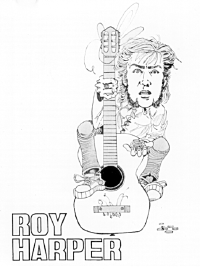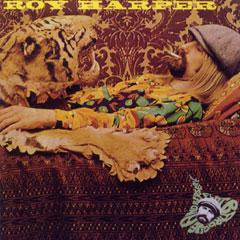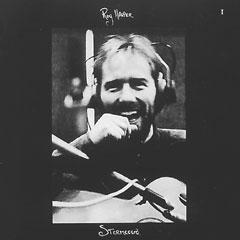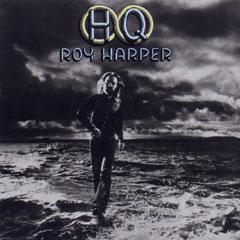


Floyd Fan's Intro
A Floyd Fan's Intro To Roy Harper
Confusion reigns down on us all
From the blistering heights of reason.
A shame we have no balls at all
On which to scratch our fleas on...."
---from "Kangaroo Blues"
Some years ago I wrote a letter to the now defunct Roy Harper fan magazine Hors d'Oeuvres", outlining my appreciation for Roy's music. Like many, I stumbled upon the name through the Led Zeppelin song, "Hats Off to (Roy) Harper", and, though I didn't quite believe it at the time (so great was my devotion to Pink Floyd), through the one line note in the fine print of the 1975 album Wish You Were Here that proclaimed "vocal on "Have a Cigar" by Roy Harper".
Not true, I thought. That's Dave. Or Roger. Or both with some of their trademark electronics to blend them together and seamlessly integrate that marvelous vocal to the rest of the album. I don't think I actually believed it was not a member of the Floyd until I noticed this same character had co-written a song ("Short & Sweet") on Gilmour's first solo album.
I remember bravely trying to categorize Roy's style, gradually adding superlatives and comparisons with each new record of his I came across (sadly, until recently his earlier works were scarce in the big record shops and even scarcer among used dealers). "A British Bob Dylan", I had proclaimed, "with the sense of humor of Loudon Wainwright. And the rustic virtuosity of Ian Anderson. Or an acoustic Frank Zappa, with vocals by Jack Bruce and lyrics by a frenzied yet friendly Charles Bukowski." Good thing I can't find that letter.
 |
The truth is that if you hunt around the net for some info on Roy, the running theme seems to be one of a man who always gets in his own way in terms of achieving "stardom" by refusing to capitulate to the powers that be. In the liner notes to the extremely scarce U.S. promo LP An Introduction to Roy Harper (not the recently released "Hats Off" compilation; rather the old Chrysalis issue), David Gilmour had this to say about his friend:
"He's one of those people who never want to compromise anything; he often takes things a lot further than I personally would, in the way he performs, but I like it. I like and admire the way he does things... his courage, getting up there and doing it that way. And his honesty and openness in the way he puts over his own life on stage. I think he's very much more talented than a lot of people who've been more successful than he has. Maybe because people are frightened of that sort of thing that he does and the kind of honesty he puts over. I think it scares a lot of people off."
The list of people Roy has played with over the years is an impressive one; for a time he was considered a "musician's musician", the unfortunate moniker attached to a not-quite-famous and ain't-it-a-shame persona. Ian Anderson (who plays on the 1974 live album Flashes From The Archives of Oblivion, as well as the epic "These Fifty Years" from 1998's thedreamsociety) was quoted in Q magazine as saying:
"Harper's style forms a lot of my personal influence as a guitar player and to some extent as a song writer... I always rather envied him. He played the same circuit as us but I was in a band with amplifiers and equipment and roadies and things and I just loved the idea that this guy arrived hitchhiking, or on the train, with his guitar case, and no money and no nothing and played a gig--and the next night he was there again, and you thought, This is wonderful."
 Flat Baroque and Berserk (1970) |
Where should you begin to explore this man's output? Any of the records from his most prolific period (1970-1975) would be the best place to start. Roy still plays many of the songs from these albums in his live performances, which are often more entertaining and inspiring than his studio releases (his Science Friction label released 6 volumes of BBC live material spanning Roy's career in 1996). The first album from this period, 1970's Flat Baroque and Berserk, features the incendiary protest song "I Hate The White Man", a scathing attack of the treatment of the American Indian, as well as the poignant, innocent, and beautiful ballad "Tom Tiddler's Ground". It also has a song with the unmistakable nice organ playing of a very young Keith Emerson, "Hell's Angels".
 Stormcock (1971) |
Perhaps Roy's finest achievement, 1971's "Stormcock", stands as one of the greatest acoustic guitar masterpieces of the twentieth century. With only four songs, Roy found room to explore both progressive chord changes and thrashing acoustic lead guitar virtuosity: the first ("Me & My Woman") with some brilliant orchestral arrangements by David Bedford, the latter ("The Same Old Rock") with the help of Roy's long time friend, Jimmy Page, playing here under the pseudonym "S. Flavius Mercurious". The other two songs on the album ("One Man Rock & Roll Band" and "Hors d'Oeuvres") contain some of the spot-on lyrics for which Roy has become known: "Welcome back, you total stranger" he invites the listener, after bombarding us with:
The critic rubs his tired arse
Scrapes his poor brains and strains and farts
And wields a pen that stops and starts
And thinks in terms of booze and tarts
And sits there playing with his parts
He says I'm much too crude and far too course
And he says this singer's just a farce
He's got no healing formulas
He's got no cure-all for our scars
He's got no bra-straps for our bras/And our sagging tits no longer hold a full house of hearts/And you know what? I don't think this little song's gonna make the charts
Indeed. It's this non-commercial aspect that has given Roy a measure of fiercely devoted fans that proudly support his unstinting effort to confront the powers that be with rash, brash, original, sometimes bitter, often insightful music. And poetry. Some of the most hauntingly beautiful lyrics since Lord Byron or T.S. Eliot have flowed from his mind:
See the juice run as she flies.
Run my wings under her sighs
As the flames of eternity rise,
To lick us with the first born lash of dawn.
(From "Another Day")
Or
I see the hollow buildings hanging in the winter sun
Throwing empty shadows that hide the hollow men.
The world just isn't real it's built on endless timeless time
on land marks in the desert wastes of multicoloured crime.
(From "Legend")
 HQ (1975) |
Finally, one other album deserves special mention: 1975's HQ (released in the U.S. as When An Old Cricketer Leaves the Crease). This is Roy's personal favorite, containing the licks of David Gilmour, Chris Spedding, Bill Bruford, John Paul Jones, and Steve Broughton, as well as the orchestral guidance of David Bedford.
The songs run the gamut from searing rock and roll (the 17-minute attack known as "The Game" features a blistering final lead solo by Chris Spedding, as Gilmour couldn't quite get it down in the studio and had to split for a Floyd tour before he could finish) to the whimsical "Grown-ups Are Just Silly Children", which tells the wink-and-nudge tale of the end of a date between a boy who couldn't quite remember his girls name ("I got up and ran when I came"). The album also contains some of the most delicate quiet passages of minimalist guitar work blended with surreal lyrics ("Hallucinating Light": I ride inside the purple dawn collecting golden dew/That falls from citadels of dreams I shake whilst flying through.
But the epitome of all that is Roy Harper is the album's final cut: "When An Old Cricketer Leaves The Crease". Never has there been a song as simple and stunning as this elegiac masterpiece. It is the quintessential homage to home that is at once thoroughly English and universal. Both sad and uplifting, hopeful and nostalgic, this song strums its way into your heart with the passion that came from its creator's... or perhaps his.
When the moment comes, and the gathering stands,
And the clock turns back to reflect,
On the years of grace, as those footsteps trace,
For the last time out of the act.
Well this way of life's recollection
The hallowed strip in the haze,
The fabled men, and the noonday sun,
Are much more than just yarns of their days.
When an old cricketer leaves the crease, you never know whether he's gone...
Harper continues to tour and record. His last two releases, thedreamsociety (1998) and The Green Man (2000), marked a return to the more acoustic, lyrical music of the 70s. Information for his Fall tour is available at http://www.royharper.com/[website] which also contains some links to interesting comments by the Rock & Rollers that have played with him through the years.